Hall of Fame
EurAI Distinguished Service Award 2020

Professor Alan Bundy
Alan Bundy is Professor of Automated Reasoning in the School of Informatics at the University of Edinburgh. His research interests include: the automation of mathematical reasoning, with applications to reasoning about the correctness of computer software and hardware; and the automatic construction, analysis and evolution of representations of knowledge. His research combines artificial intelligence with theoretical computer science and applies this to practical problems in the development and maintenance of computing systems. He is the author of over 300 publications and has held over 60 research grants.
He is a fellow of several academic societies, including the Royal Society, the Royal Society of Edinburgh, the Royal Academy of Engineering and the Association for Computing Machinery, and the Society for the Study of Artificial Intelligence and Simulation of Behaviour (AISB). His awards include the IJCAI Research Excellence Award (2007), the CADE Herbrand Award (2007) and a CBE (2012). He was: Edinburgh’s founding Head of Informatics (1998-2001); founding Convener of UKCRC (2000-05); and a Vice President and Trustee of the British Computer Society with special responsibility for the Academy of Computing (2010-12). He was also a member of: the Hewlett-Packard Research Board (1989-91); the ITEC Foresight Panel (1994-96); both the 2001 and 2008 Computer Science RAE panels (1999-2001, 2005-8); and the Scottish Science Advisory Council (2008-12).
Sponsored by

EurAI Fellows 2019 and 2020
2019
Amedeo Cesta (Italy)
Alfonso Gerevini (Italy)
Kristian Kersting (Germany)
Shaul Markovitch (Israel)
Anna Paiva (Portugal)
Francesca Toni (UK)
2020
Isabelle Bloch (France)
Joao Gama (Portugal)
Gianluigi Greco (Italy)
Malte Helmert (Switzerland)
Holger Hoos (Netherlands)
Thomas Lukasiewicz (UK)
Michael Luck (UK)
Sponsored by

ECAI2020 Distinguished papers
A Conditional Perspective for Iterated Belief Contraction
Kai Sauerwald, Gabriele Kern-Isberner and Christoph Beierle
Learning Deterministic Automata on Infinite Words
Jakub Michaliszyn and Jan Otop
Trepan Reloaded: A Knowledge-driven Approach to Explaining Black-box Models
Roberto Confalonieri, Tillman Weyde, Tarek Besold and Fermin Moscoso del Prado Martin
Neural Large Neighborhood Search for the Capacitated Vehicle Routing Problem
André Hottung and Kevin Tierney
Consolidating Modal Knowledge Bases
Zied Bouraoui, Jean-Marie Lagniez, Pierre Marquis and Valentin Montmirail
Lifted Heuristics for Timeline-based Planning
Riccardo De Benedictis and Amedeo Cesta
EurAI 2019 Artificial Intelligence Dissertation Award
Winner
Dominik Peters – University of Oxford, UK
Thesis: Fair Division of the Commons
Honourable Mentions
Avi Segal – Ben Gurion University of the Negev, Israel
Thesis: Intelligent Intervention Design in Large Scale Task Systems
Markus Ulbricht – Leipzig University, Germany
Thesis: Understanding Inconsistency – A Contribution to the Field of Non-monotonic Reasoning
Sponsored by

STAIRS Papers Awards
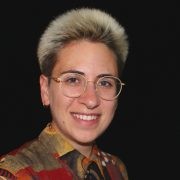
Anna Rapberger
I am currenty a PhD student in Computer Science at TU Wien supervised by Prof. Stefan Woltran, participating in the Austrian doctoral program Logical Methods in Computer Science (LogiCS) funded by the FWF. I received my Masters degree in Mathematics with a focus on logic from the University of Vienna in July 2018.
Website(s):
https://logic-cs.at/phd/students/anna-rapberger/
https://www.dbai.tuwien.ac.at/staff/arapberg/
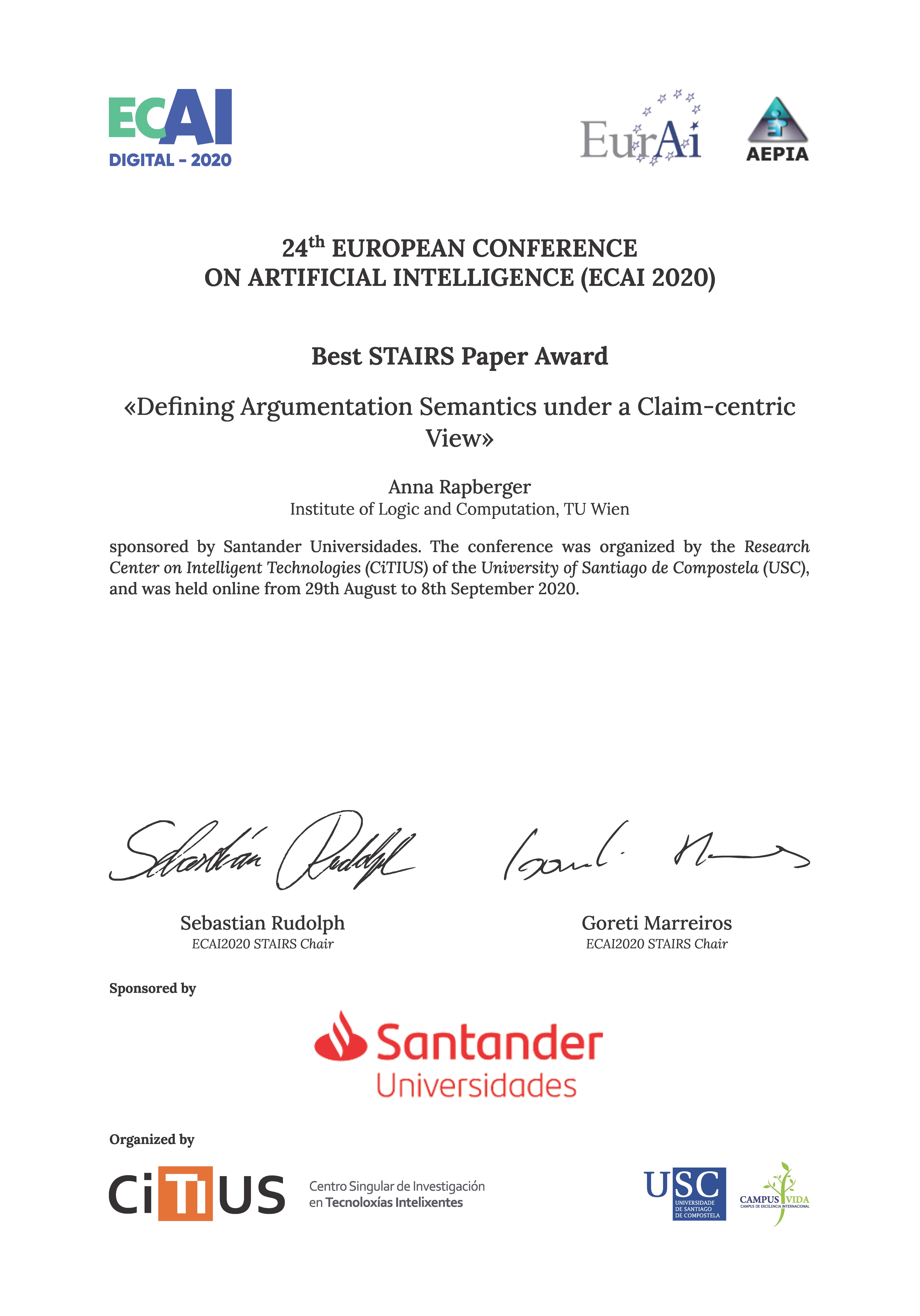
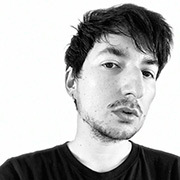
Vicent Costa
I am a doctoral candidate at the Autonomous University of Barcelona and a Predoctoral Fellow at the Department of Philosophy at the same institution. I also developed part of the research at the Reasoning and Logic Department of the Artificial Intelligence Research Institute (IIIA-CSIC), and the Bremen Spatial Cognition Center (University of Bremen). My research interests range from the foundations of mathematical fuzzy logic to artificial intelligence. In this way, my theoretical research focuses on the universal Horn fragment of predicate fuzzy logics. Furthermore, my research on artificial intelligence centers in fuzzy knowledge representation and qualitative modeling mainly applied to art painting style categorization. Diverse presentations at international conferences, book chapters, and journal papers arose from both lines of research.
Website:
https://www.researchgate.net/profile/Vicent_Costa
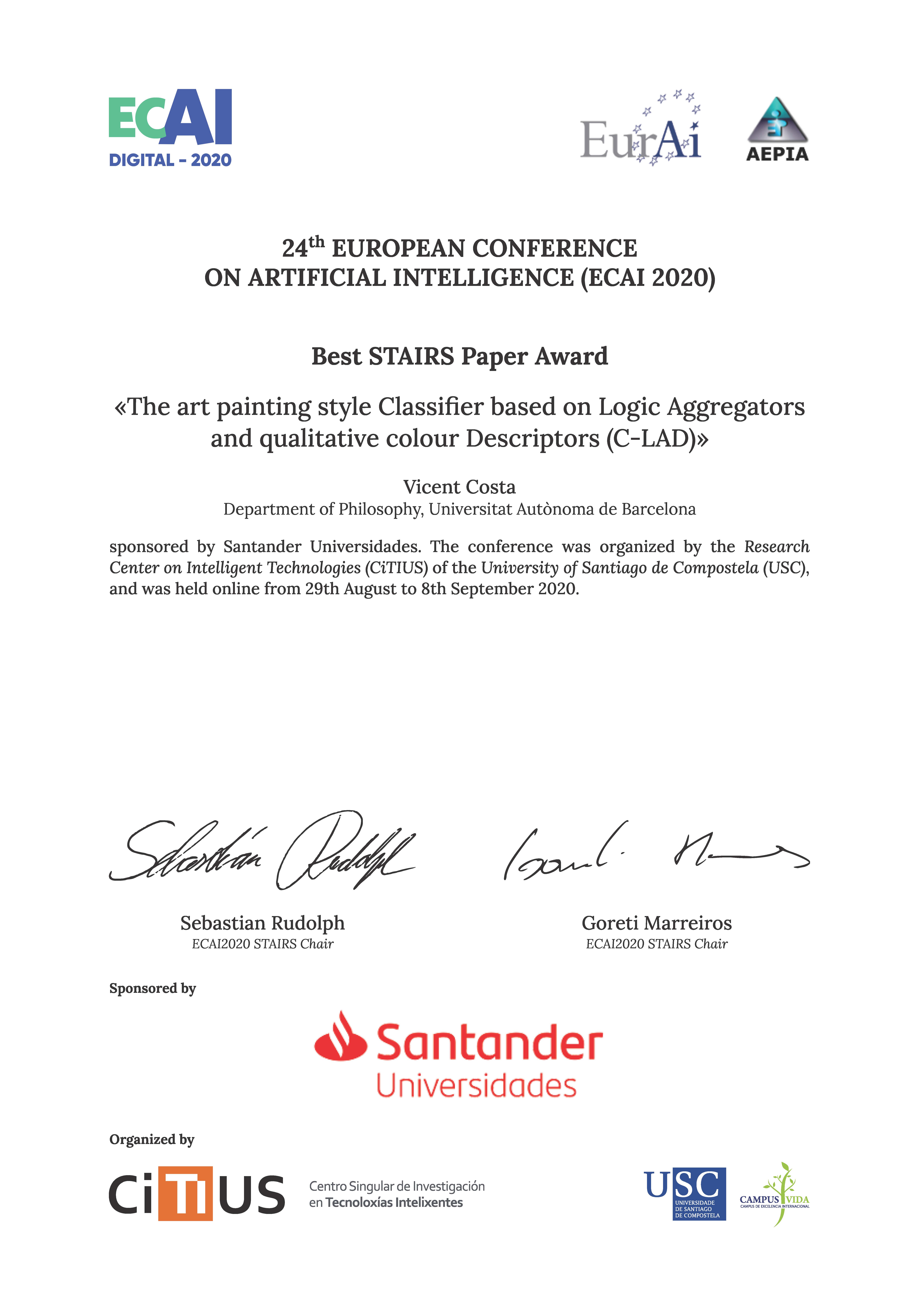
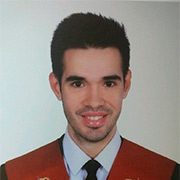
Sergio Martínez Agüero
Sergio Martínez Agüero received the Degree in Telecommunications Technologies Engineering in 2018 at Rey Juan Carlos University. The Degree Thesis, entitled Automatic learning methods for the analysis and prediction of germ resistance to antibiotics in the ICU, obtained the maximum qualification, outstanding Honorable Mention. The supervisors of this Thesis was Cristina-Soguero Ruiz and Inmaculada Mora-Jiménez, with collaboration with the Chief of the Intensive Care Unit of the University Hospital of Fuenlabrada, doctor Joaquín Álvarez Rodríguez. The material of this Thesis was extended, prompting two conference papers submitted and accepted at the Annual Congress of the Spanish Society of Biomedical Engineering, 2018.
He is pursuing the University Master Degree in Telecommunication Engineering at Rey Juan Carlos University. He is currently working on his Master’s Thesis, entitled Deep learning methods on graphs for the prediction of antimicrobial multi-resistance in ICU, which extends the research line of the Degrees Thesis.
Website:
https://gestion2.urjc.es/pdi/ver/sergio.martinez
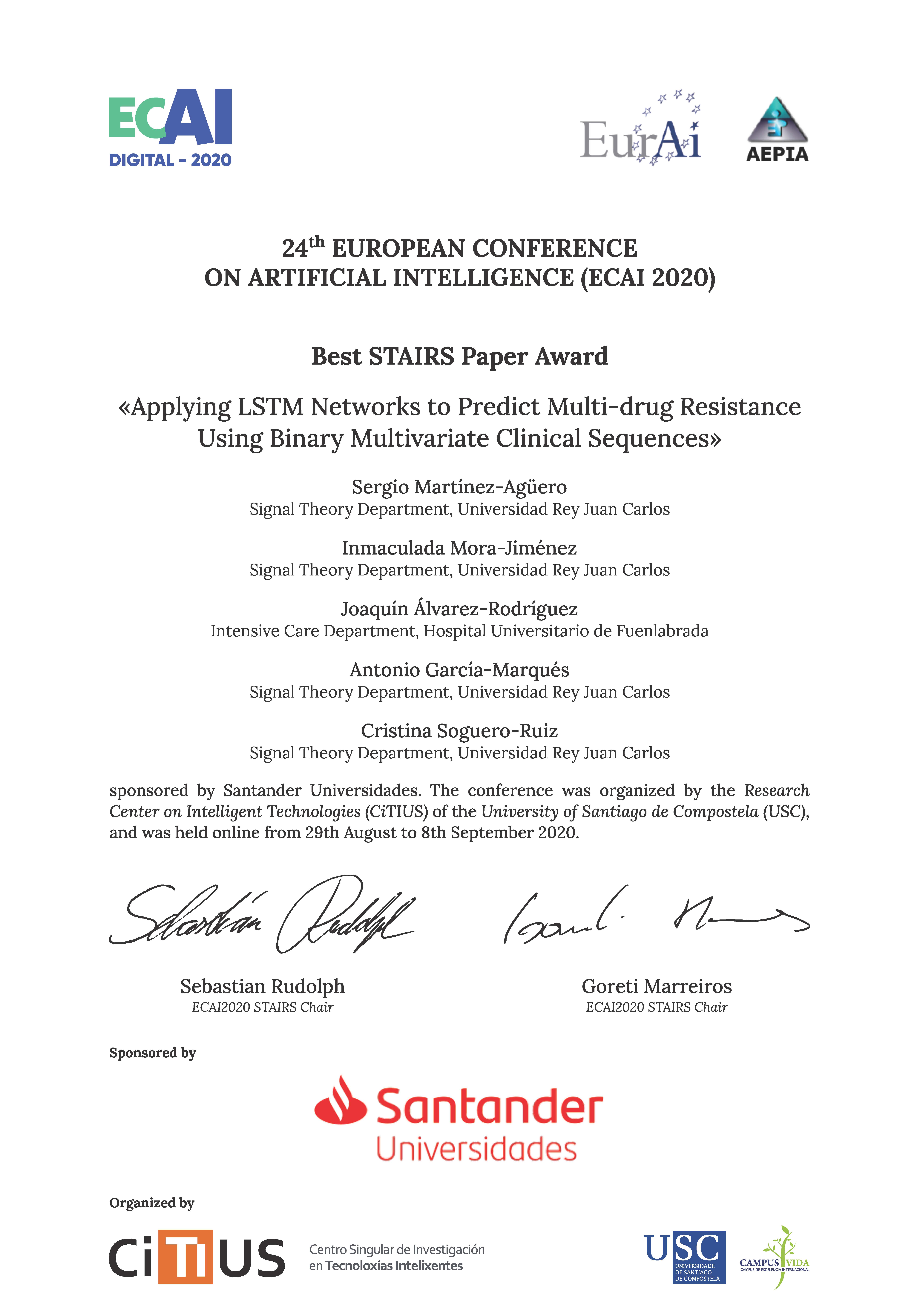
This award is along with a 3 months grant for a research stay at the Research Centre on Intelligent Technologies of the University of Santiago de Compostela (CiTIUS)
Sponsored by

Pitch Competition at Lab2Market – Winner
WearHealth UG
Presented by Esteban Bayro-Kaiser
Sponsored by

Doctoral Consortium Presentation Awards
Fernando E. Casado
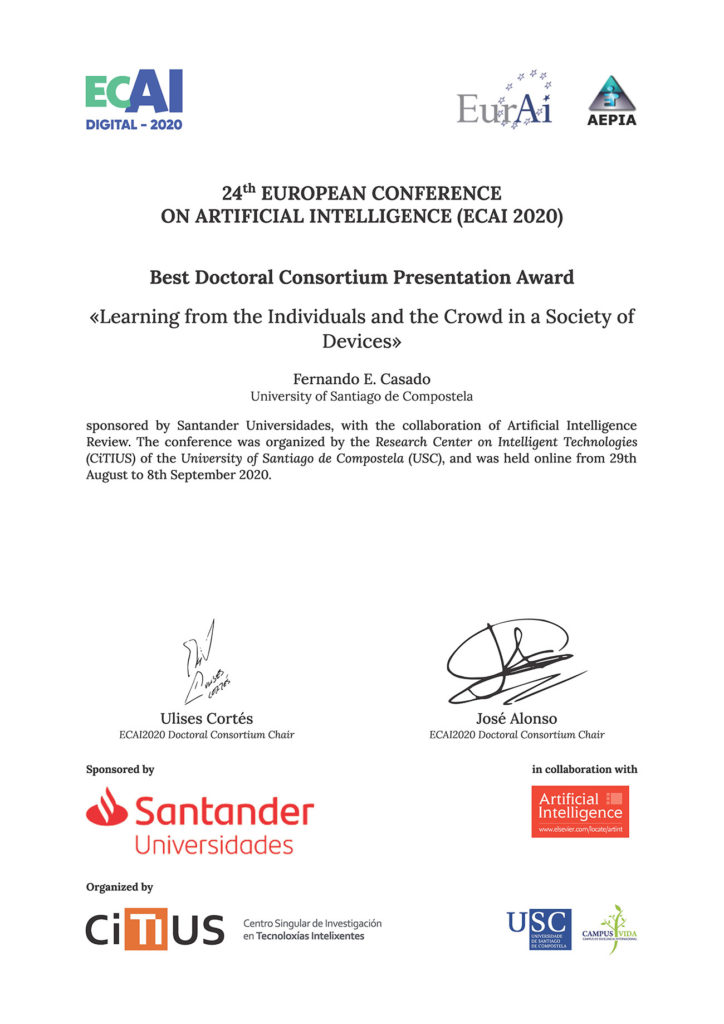
Weilai Xu
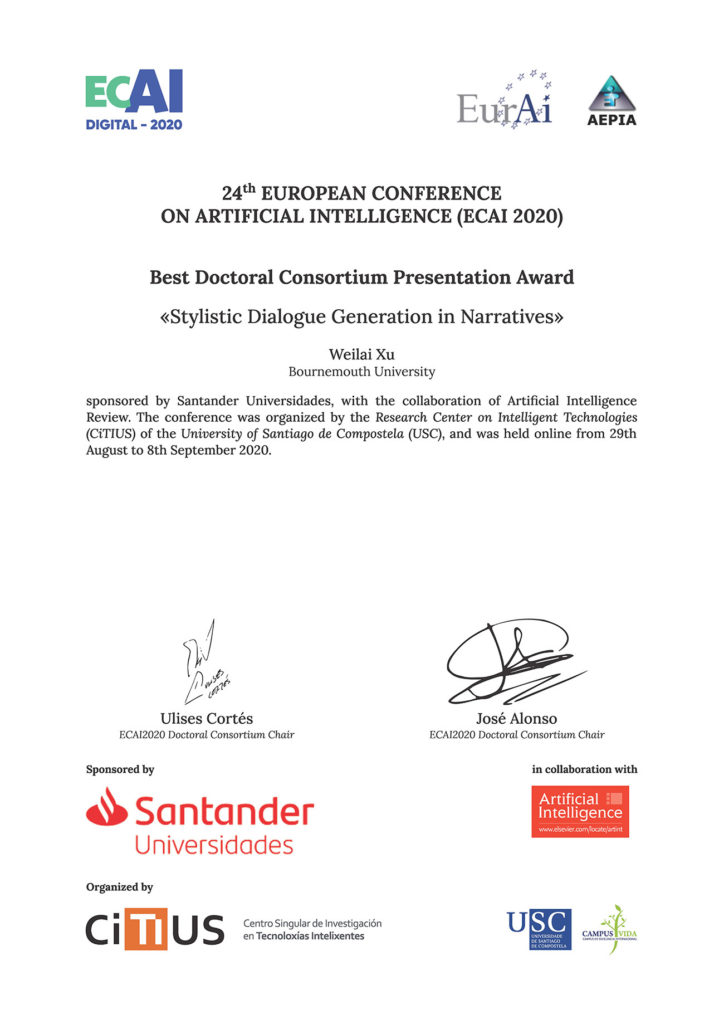
Norah Aldahash
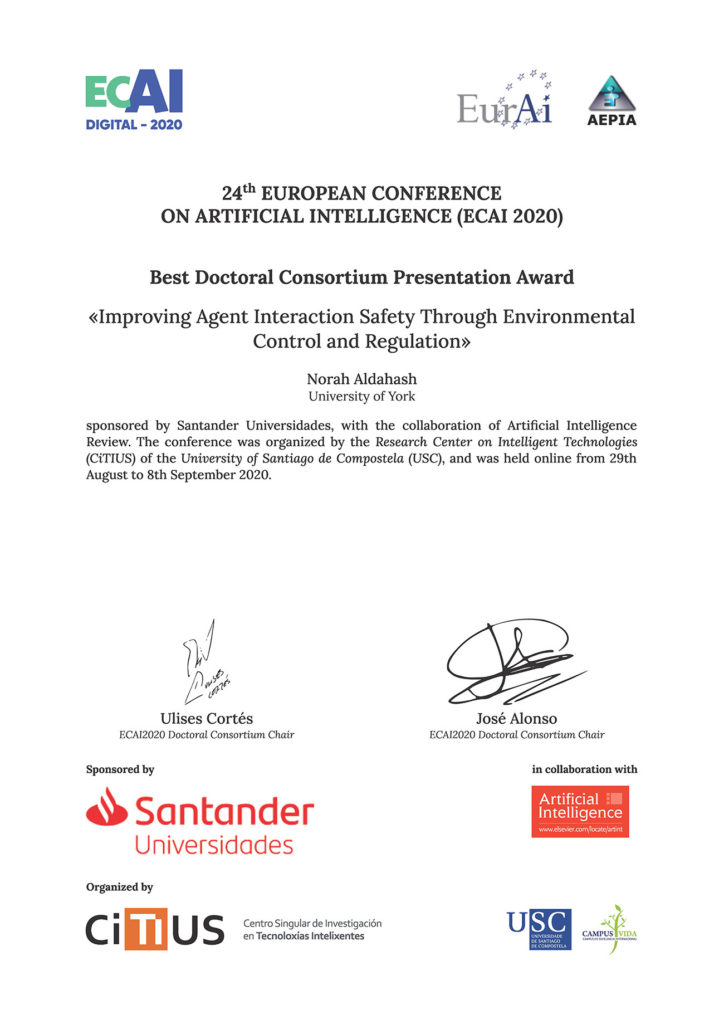
This award is along with a 3 months grant for a research stay at the Research Centre on Intelligent Technologies of the University of Santiago de Compostela (CiTIUS).
Sponsored by

in collaboration with

Doctoral Consortium Presentation Finalists
Norah Aldahash
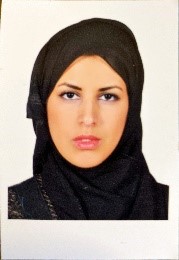
Norah AlDahash is a lecturer at the college of computer and information sciences at King Saud University since 2013. She earned her MSC in software engineering from KSU where her thesis focused on affective computing and Brain Computer Interaction. Her research interests include multi agent systems and artificial intelligence, verification and validation of AI. She is currently completing her PhD studies at University of York, UK
Fernando E. Casado

Fernando E. Casado received his B.S. degree in Computer Engineering from the University of Santiago de Compostela (2017), and his M.S. degree in Artificial Intelligence Research from Menéndez Pelayo International University (2018). He is currently a Ph.D. student at CiTIUS (University of Santiago de Compostela). His research interests are focused on the field of machine learning.
Website: https://citius.usc.es/v/fernando-estevez-casado?language=en
Ignacio Huitzil
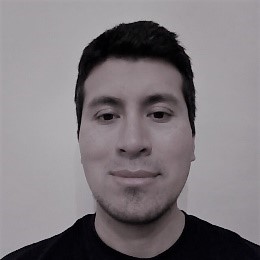
Ignacio Huitzil is a PhD student in Informatics and Systems Program at Department of Computer Science and Systems Engineering (University of Zaragoza) in Spain. The main topic of his research studies is fuzzy management of semantic web information in special fuzzy ontologies and reasoning engines. He is interested in application development of this topic mainly in security, making-decision, mobile reasoning, e-commerce and recommendation systems
Corentin Kervadec
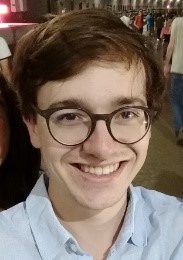
After graduating from a master’s degree in Electronics & Computer Engineering at INSA Rennes (France) in 2018,I joined the Imagine team (LIRIS, INSA Lyon, France) as a PhD student under the direction of Christian Wolf.
My work focuses on Deep Learning applied to Vision and Language, with a special interest on Visual Reasoning and Visual Question Answering (VQA).
Website: https://corentinkervadec.github.io/https://twitter.com/CorentK
Periklis Mantenoglou
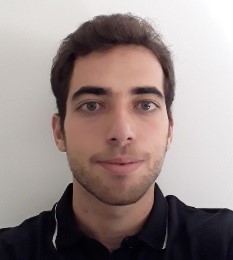
I am a PhD student from Department of Informatics and Telecommunications, University of Athens. My main research interests focus on the development of a system used for event recognition in a streaming environment. I have a BSc, followed by a Master’s degree in Electrical and Computer Engineering.
Website: https://www.iit.demokritos.gr/people/periklis-mantenoglou/
Ettore Mariotti
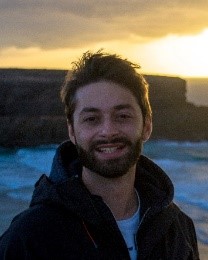
Ettore Mariotti graduated in Information Engineering (bachelor) and in Telecommunication Engineering (master). After some work in analyzing astrophysical data with deep learning, he is now a Ph. D. student focusing on machine learning explainability with the goal of automatically describing the behavior of black-box models using natural language.
Website: https://www.linkedin.com/in/ettore-mariotti-a688263/
Noelia Rico
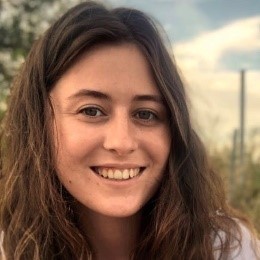
Noelia Rico has a B.Sc. in software engineering from the University of Oviedo and a M.Sc in research in artificial intelligence and data mining from the Menéndez Pelayo International University. Currently, she is doing a PhD in computer science at the University of Oviedo, where she also teaches lessons in subjects such as Databases and Computability. Her research interests are machine learning methods and their applications. She is most interested in clustering methods as well as the validity indexes used to evaluate the clusters that these methods generate.
GitHub link: https://github.com/noeliarico
Gabriele Sartor
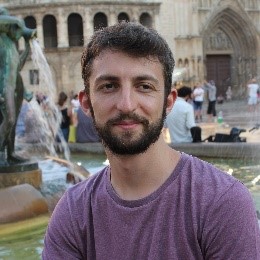
I’m a PhD student at the Computer Science Department of the University of Torino. I have worked on robotics and AI systems, participating in RoboCup Soccer competitions and developing high-level planning softwares, also in aerospace projects.
Currently, my studies are focusing on the integration of high-level planning and learning to extend the architecture of IMPACT for robots.
Website: http://www.di.unito.it/~sartor/
Armand Vilalta
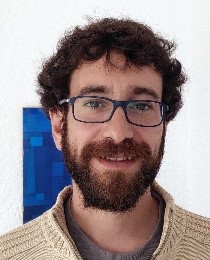
Armand Vilalta obtained degree and master in civil engineering and devoted almost 10 years to its professional practice, participating in the design and construction of several singular projects. Armand obtained a master in artificial intelligence by UPC, UB and URV and started research in computational neuroscience at the National Institute of Informatics of Japan. After joining High Performance Artificial Intelligence group at BSC he started his PhD on Semantic Embeddings in Deep Convolutional Neural Networks.
Website: https://futur.upc.edu/21872012
Weilai Xu

I am a PhD student from Department in Creative Technology, Bournemouth Univerisy. My main research interests focus on natural language generation and interactive narrative. I have a BSc in Digital Media, followed by a Master’s degree in Computer Graphics Technology.
Website: https://staffprofiles.bournemouth.ac.uk/display/wxu#overview
https://scholar.google.com/citations?user=_L-2cjsAAAAJ&hl=en

